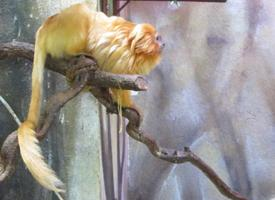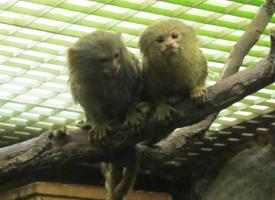
Greutăți și măsuri
| Lungime | de la 19 la 22 cm |
|---|---|
| Greutate | de la 550 la 700 g |
| Lungimea cozii | de la 26 la 34 cm |
Date biologice
| Durata gestației | de la 132 la 134 d |
|---|---|
| Numărul de pui | 1 - 2 |
Starea de conservare
| Amenințat |
Descrierea animalului
The Golden Lion Tamarin, scientifically known as Leontopithecus rosalia, is a small, striking primate that captures the imagination with its vibrant golden-orange pelage and expressive face. Native to the Atlantic coastal forests of Brazil, this species is among the most endangered animals in the world, with conservation efforts in place to protect its dwindling habitats and populations.Characterized by its lush, golden fur, which contrasts sharply with its dark, expressive eyes, the Golden Lion Tamarin is a visual spectacle in the animal kingdom. This fur not only provides the animal with a regal appearance, reminiscent of a lion's mane, which is how it earns its name, but also serves as a crucial camouflage tool within the dappled sunlight of its forest habitat.
Adults typically weigh around 600 to 700 grams, with a body length ranging from 20 to 33 centimeters and a tail that can be up to 40 centimeters long. The tail is not prehensile but helps in balancing as they leap through the forest canopy. Their small, agile bodies are perfectly adapted to their arboreal lifestyle, enabling them to navigate through the trees with remarkable dexterity.
Golden Lion Tamarins are social animals, living in closely knit groups of around two to eight individuals, usually comprising a breeding pair and their offspring. These groups are highly territorial, defending their home ranges fiercely against intruders. Their diet is omnivorous, consisting of fruits, flowers, nectar, insects, small invertebrates, and even small vertebrates, showcasing their adaptability in terms of feeding habits.
Communication among Golden Lion Tamarins involves a complex system of vocalizations, body postures, and facial expressions. These communications serve various purposes, including the coordination of social activities, expression of emotional states, and warnings of predator presence or territorial intrusions.
Reproduction in Golden Lion Tamarins is a unique aspect of their social life. They typically give birth to twins, which is somewhat rare among primates. The entire group assists in the care of the young, a behavior known as alloparenting. This cooperative care not only increases the survival rate of the offspring but also strengthens social bonds within the group.
The conservation status of the Golden Lion Tamarin is critically endangered, primarily due to habitat loss, fragmentation, and degradation caused by deforestation for agriculture and urban development. Illegal pet trade also poses a significant threat to their dwindling populations. In response, numerous conservation initiatives, including habitat restoration, captive breeding and reintroduction programs, and environmental education, have been implemented to protect and preserve these magnificent creatures and their natural habitats.
In conclusion, the Golden Lion Tamarin stands out as a symbol of the beauty and fragility of our planet's biodiversity. Its struggle for survival amidst the encroaching threats of human activity highlights the urgent need for continued conservation efforts. Through these endeavors, there is hope that future generations will continue to witness the beauty of the Golden Lion Tamarin in its natural habitat, securing its place in the world's natural heritage.
Animale similare
Fotografii noi cu animale
Top 10 animale
- Diana monkey (Cercopithecus diana)
- Dolphin gull (Leucophaeus scoresbii)
- Galápagos tortoise (Geochelone nigra complex)
- Moustached guenon (Cercopithecus cephus)
- Japanese spider crab (Macrocheira kaempferi)
- Colossal squid (Mesonychoteuthis hamiltoni)
- Fox tapeworm (Echinococcus multilocularis)
- Stone loach (Barbatula barbatula)
- Japanese macaque (Macaca fuscata)
- Barbary macaque (Macaca sylvanus)
